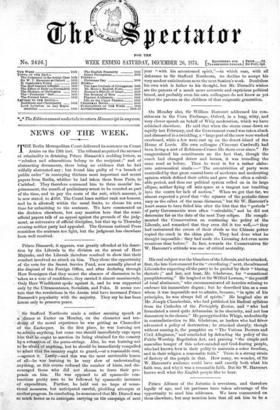His real subject was the blunders of the Liberals, and
he attacked, first, the late Government for its " overdosing ;" next, the advanced Liberals for expecting all the party to be guided by their " blazing rhetoric ;" and last, not least, Mr. Gladstone, for " sensational pamphleteering." He laughed at Sir Wilfrid Lawson, " the pontiff of total abstinence," who excommunicated all heretics refusing to embrace his immaculate dogma ; but he described him as a man whom it was impossible not to admire, because, " in spite of his principles, he was always full of spirits." He laughed also at Mr. Joseph Chamberlain, who had published his Radical syllabus from the Cathedra of the Fortnightly &view, and " who had formulated a creed quite Athanasian in its obscurity, and not less damnatory in its clauses." He panegyrised the Whigs, undoubtedly in contradistinction to Mr. Gladstone, as leaders who had fever advocated a policy of destruction ; he attacked sharply; though without naming it, the pamphlet on " The Vatican Decrees and Civil Allegiance," and concluded by defending the policy of the Public Worship Regulation Act, and praising " the simple and masculine temper of this sober-minded and God-fearing people, who had known how in their polity to maintain a sober freedom, and in their religion a reasonable faith." Tbere is a strong strain of flattery of the people in that. How many, we wonder, of Sir W. Harcourt's audience could have said exactly both what his faith was, and why it'was a reasonable faith. But Sir W. Harcourt knows well what the English people like to hear.


































